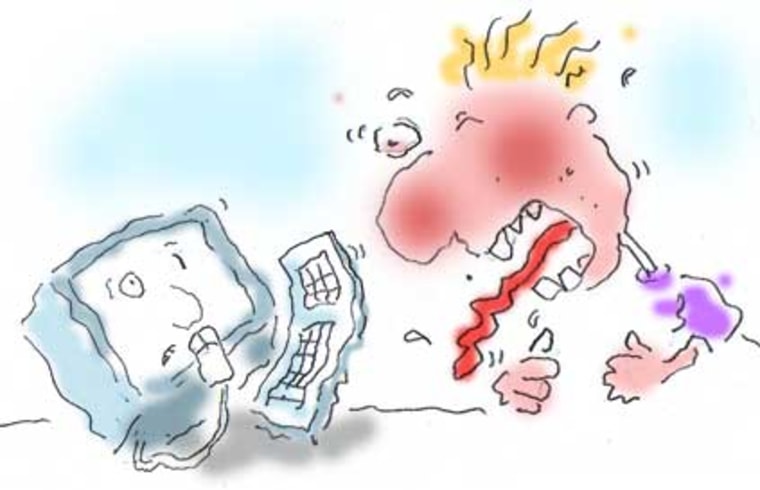The first few moments in any crisis response are critical, and mistakes can be costly. So it is with misbehaving computers.
Yet the first step for many users after a computer crash is to hit or yell at their machine, according to a new survey. The helpless feeling of data slipping away into a black hole seems to be more than many computer users can bear. According to the survey, more people commit some act of computer violence than call for help when faced with a crisis, according to a survey conducted by New York-based Ontrack Data Recovery.
Fortunately, violence isn't the only response. About 13 percent of survey participants said they attempt to sweet-talk their computers into coughing up any lost data, said Todd Johnson, vice president data recovery at Ontrack. Another non-violent response is the most popular, he said -- about one-third of respondents said they immediately just resign themselves to loss of the data.
But 7 percent said their first reaction is the hit the computer, Johnson said, a step that's rarely productive. Another 13 percent yell at the computer first.
"It's hard when people lose data," he said. "People do begin to panic."
The Ontrack study results parallel a study conducted recently by the University of Maryland's Laboratory for Automation Psychology and Decision Processes. A full 10 percent of respondents to that poll indicated that had committed violence against the computers in frustration, said Dr. Kent L. Norman.
"There was one restaurant manager who was so upset with his laptop that he threw it into a deep fryer," Norman said. "That destroyed the laptop ... and deep fryer, too."
That might sound extreme, but few computer users haven't considered tossing a misbehaving PC out an office window at one time or another. One respondent in Norman's study did just that, but left out an important step.
"His mistake was he forgot to open the window," Norman said.
Besides the obvious physical damage, such overreactions can have an even higher cost, Johnson said — often, lost data can be saved by experts, but not if a computer has already been deep-fried.
If you hear that grinding sound, don't reboot
In fact, the usual, conventional wisdom response — turning the computer on and off again, several times — can actually make things worse. The phrase "computer crash" has become a generic term, referring to anything that makes the computer freeze or stop operating. But the term actually refers to a mechanical breakdown. When a computer hard drive literally crashes, the head mechanism that reads the data physically crashes into the spinning platter that stores the data. Rebooting repeatedly just scratches the platter again and again, making recovery that much more difficult.
"If you hear a grinding sound, like squealing, the first thing you want to do is turn off your computer, and don't turn it back on," Johnson said.
Even those consumers who curb their violent impulses tend to do the wrong thing by attempting to fix the problem themselves. Some even start disassembling hard drives in an attempt to recover lost data, Johnson said. Such electronic experimentation can make matters worse.
But there's a reason for computer individualism, Johnson suggested. Many consumers don't think to look for help because of the subtle training they have received from overworked and sometimes sarcastic technical support staff.
"I think people don't know where to turn," he said. "And some of the (technical support) cultures in corporations have had an unwritten policy, 'If you don't back up your data, you are out of luck. We're not gonna help you.'"
Increased use of laptop computers away from the home office — and away from technical support — has also led to an increase in self-help, Johnson said. From there, that helpless feeling of lost data creeps in, and often gives way to anger.
'A tremendous amount of rage out there'
But Norman, who's a psychologist by training, thinks there are more subtle reasons for people over-reacting to computer trials and tribulations. Modern life requires people to spend endless hours working with more and more complicated machines — computers, cell phones, PDAs, even high-tech cars — and slowly but surely, there is a loss of predictability and control.
"We are dealing with so many complex things and we don't really know how they work," he said. "And we are extremely dependent on these things."
When "these things" break, stored frustration can explode into rage, particularly when people spend seven or eight hours each day in front of a computer, Norman said. In fact, he thinks road rage might be the result of what he calls "computer rage." After a long, hard day of computer crashes, one unfriendly driver on the way home can set off a person who is already near the edge.
"The bottom line is there is a tremendous amount of rage out there," he said.
To avoid the kind of computer rage you might regret later, Norman suggests using a strategy that's familiar to parents: take a break.
"Usually, the best thing to do is to get out of the environment. Just like if you get mad at your kids. Leave the house, leave the office, cool down for 10 to 20 minutes," he said.
In fact, Norman thinks companies could benefit from instituting 15 minute "frustration breaks" that employees could take during the week. Consider it the 21st century version of Industrial Age break-time.
Whatever the approach, the lesson from Ontrack's survey is clear: When something goes wrong with your computer, the best thing to do is slowly drop the mouse and step away from the keyboard.
"Remain calm. There are solutions out there," Johnson said.
Bob Sullivan is author of Your Evil Twin: Behind the Identity Theft Epidemic
